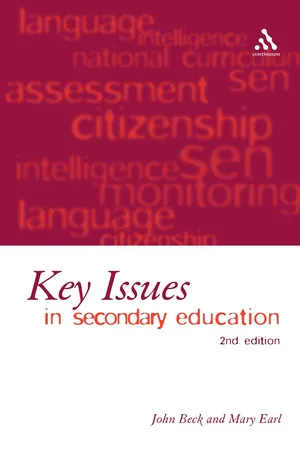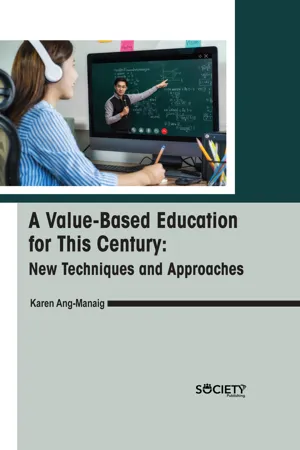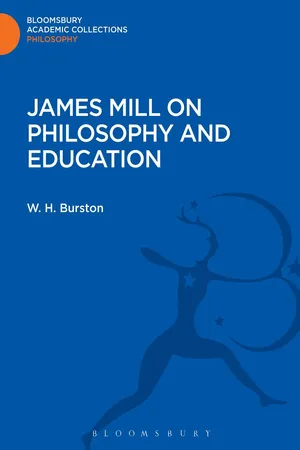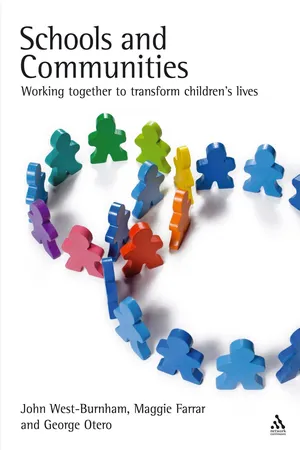Social Sciences
Value of Education
The value of education refers to the benefits and significance of acquiring knowledge, skills, and understanding through formal learning processes. It encompasses the personal, social, and economic advantages that education provides, such as improved critical thinking, enhanced opportunities for employment, and the potential for positive societal change. Education is widely recognized as a fundamental pillar for individual and collective progress.
Written by Perlego with AI-assistance
Related key terms
1 of 5
7 Key excerpts on "Value of Education"
- eBook - PDF
Key Issues in Secondary Education
2nd Edition
- John Beck, Mary C. Earl(Authors)
- 2003(Publication Date)
- Continuum(Publisher)
Part III Values, Morality and Citizenship: Issues in Personal, Social and Health Education This page intentionally left blank Chapter 13 Values in Education TERENCE H. MCLAUGHLIN INTRODUCTION Education cannot be value-free. Every action (and every omission) of a teacher is value-laden and so is every aspect of the ethos and organization of the school. Education is inherently saturated with value. Since education cannot be value-free, we cannot therefore avoid fundamental questions such as: which values should education embody and transmit, why? and how? What is meant by the term 'value'? Although much more needs to be said about this question, for the purposes of the present chapter values can be regarded in a rather broad way as criteria (standards or principles) for judging worth. There are, of course, many things which may be valued or judged worthy (including, for example, personal qualities, forms of under-standing and states of affairs) and many respects and aspects in which they may be seen to be valuable or of worth. A significant range of values are of relevance and importance for education. EDUCATION AND THE INESCAPABILITY OF VALUES The inescapability of values in education is obvious. Let us reflect on the activity of the teacher in the classroom. In seeking to bring about learning, the teacher engages in a wide range of activities including describing, explaining, initiating discussion, prescribing study-related tasks, encouraging, admonishing and the like. All these complex and interrelated activities presuppose that the kind of learning which is being aimed at is thought valuable in some way. The teacher of history, for example, assumes that it is valuable for students to study history in general and valuable that the students study the specific periods and aspects of history which are being taught. - Karen Ang-Manaig(Author)
- 2023(Publication Date)
- Society Publishing(Publisher)
This is the type of education that gives credence to the ambitions of parents to give children the best start in life. However, value-based education is rich in as far as it is not confined to books but includes extracurricular activities that are all aligned with the morals and values of the community. Through this education system, children can be helped develop holistically. It is an indication of an education system that allows for the development of the whole person rather than aspects of the experience. Figure 7.1 summarizes some of the key benefits of value-based education. Figure 7.1: The benefits of value-based education. Source: Leverage Edu. Importance of Value-Based Education 177 The value-based education system is international in its outlook because it allows for empathy for communities across the globe (Universities UK, 2014; Urgup and Aslan, 2015; Van Puyenbroeck and Maes, 2008; Vasagar, 2011; Vinson and Parker, 2019). Hence, such education will embed the values that are consistent with global citizenship. This is an indication that is particularly relevant at a time when the world is facing a moral crisis. The education system can improve the character of children so that they have the strength to deal with the temptations and challenges of life. Moreover, the education system allows learners to develop competencies that extract the maximum value from the resources that are available to them. The graduates of this education system will be able to survive and thrive in any context by utilizing all the resources that are available rather than waiting for someone to rescue them from their problems (Rassool, 1999; Renshaw et al., 2010; Rienties et al., 2012; Robinson, 2007; Robinson, 2020; Ryan and Deci, 2000; Röling and Jiggins, 1994). It is an empowering form of education that uses the local knowledge and experience of people that have lived in the community.- eBook - PDF
Management Under Differing Value Systems
Political, Social and Economical Perspectives in a Changing World
- Günter Dlugos, Klaus Weiermair, Wolfgang Dorow(Authors)
- 2019(Publication Date)
- De Gruyter(Publisher)
This paper attempts to explain divergencies of this kind focusing on social values and social value changes as the primary explanatory variables. The paper is organized as follows: part II will provide a discussion of economic factors linking education and employ-ment or the production and utilization of skills, part III will demonstrate the strategic importance of social values in the design of the education system and, finally, part IV will briefly discuss implications of social value differences with respect to the structure and performance of organization-external and -internal labour markets. II We shall start our discussion of linkages between education and labour or the education- and employment-system by first analyzing economic properties of qualifications which in the Values and Education and Labour Markets 181 main are produced through the system of education. Subse-quently, we will describe typical adjustments and adaptations of firms and individuals to the availability of alternate forms and levels of human capital. Qualifications obtainable within a given social system of education (learning and training) are linked to the system of employment and, hence, to the internal allocation of labour within employing organizations, through three distinct elements or characteristics. These are: 1) cognitive and noncognitive skills produced through education and training and destined for ultimate utilization in employment, 2) information about skill levels and skill proficiencies and its availability to both the potential employer and the skill holder, and finally, 3) social qualifications acquired as joint products of schooling or training through various forms of socialization processes, which yield alternative attitudes and values with respect to work and work organization. - eBook - PDF
- Joseph L. DeVitis, Pietro A. Sasso(Authors)
- 2016(Publication Date)
These are some of the problems an adequate education for global citizen- ship must address. Liberal education tuned for this era will enable students to understand their own positionality and those of others in the contemporary world system. The value of this kind of education is politically instrumental in two senses: the liberally educated individual will be a person with a more effective scope of agency, better able to navigate and effect change in global civil society, and in turn, a society of liberally educated citizens will be better able to deliberate about public policy and social justice. Hence, a liberal edu- cation tuned for this global era has considerable instrumental value both for the liberally educated and for society. The Intrinsic Value of Liberal Education I have addressed the questions of the instrumental worth of a liberal educa- tion in general because that is what seems to be of most immediate concern to students and their families, and it is certainly what is occupying the anxious imagination of the popular media. The question I now turn to is this: Does pursuing a liberal education have intrinsic worth? That is, would it be worth doing even if nothing further came of it? Would it be worth choosing for its own sake, aside from all of its considerable instrumental value, both to the individual and to a society of liberally educated persons? The answer is yes. To orient our thinking about the very idea of some- thing being intrinsically valuable, consider a small range of human endeavors or experiences which we hold to have great worth in and of themselves. The candidates are surprisingly few, I believe, and include endeavors or experi- ences like: loving another person; engaging in worship for those who practice a faith; having an aesthetically moving experience of art or music or nature; practicing benevolence, kindness, generosity, or compassion. - Anita L. Wenden(Author)
- 2012(Publication Date)
- SUNY Press(Publisher)
Environmental edu- cators view value systems as an important factor in determining the kind and extent of a society’s impact on ecosystems (Engleson cited in Braus & Wood, 1993) and value change as a requisite to changing attitudes and behaviors that harm the envi- ronment (Braus & Wood, 1993). Therefore, D. W. Orr (1992) points to the need to complement objectivity with a strong value orientation in educating for sustain- able living in a finite world. In fact, dating back to 1975, value learning is explicitly included as constitutive of the goals of environmental education in a series of basic texts on this topic issued by international conferences organized or sponsored by the United Nations (figure 6.2). 2 VALUE-BASED PERSPECTIVE DEVELOPMENT 151 FIGURE 6.2 Documents which Include Values as Content in Environmental Education Place & Date Title of Document Belgrade, 1975 The Belgrade Charter: A Global Framework of Environmental Education Tblisi, 1977 The report of the Intergovernmental Conference on Environmental Education Moscow, 1987 International Agenda Strategy for Environmental Education and Training for the 90’s Rio, 1992 United Nations Commission for the Environment and Development, Chapter 36 of Agenda 21 1996 Learning: The Treasure Within. Report to the UNESCO International Commission Education for the 21 st Century Montreal 1997 Montreal Declaration on Environmental Education at the Planet’ERE Forum Source: Based on Orellana & Fauteux, 2000. VALUES FOR A PERSPECTIVE ON SOCIAL AND ECOLOGICAL REALITIES Central to either peace education or environmental education or to both fields, the following value concepts are proposed as the core components of a per- spective for analyzing and evaluating the social and ecological realities of our time, that is, nonviolence, social justice, ecological sustainability, intergenerational equity, and civic participation.- eBook - PDF
- W. H. Burston(Author)
- 2013(Publication Date)
- Bloomsbury Academic(Publisher)
If this alone is meant by education, it is no doubt true that education is very far indeed from being all-powerful. But if in education is included everything, which acts upon the being as it comes from the hand of nature, in such a manner as 1 Essay on Education, op. cit., pp. 41-2. POLITICAL AND SOCIAL EDUCATION 199 to modify the mind, to render the train of feelings different from what it would otherwise have been; the question is worthy of the most profound consideration.' 2 Mill does not commit himself to Helvetius' famous assertion: 'L'education peut tout', but he does say, on empirical grounds: 'This much, at any rate, is ascertained, that all the difference which exists, or can be made to exist, between one class of men, and another, is wholly owing to education.' 3 This definition enabled Mill to include under the term 'educa-tion' the influence of the family, both before and during school-days: this he entitled Domestic Education. More important from the point of view of this chapter is that he also extended the term education to apply after school-days, and throughout life and therefore arrived at concepts of Social and Political Education, or the influence of Society and of the State upon our characters and abilities. 'Social Education', says Mill, 'is that in which Society is the Institutor. That the Society in which an individual moves pro-duces great effects upon his mode of thinking and acting, every-body knows by indubitable experience. The object is, to ascer-tain the extent of this influence, the mode in which it is brought about, and hence the means of making it operate in a good, rather than an evil direction. 'The force of this influence springs from two sources: the principle of imitation; and the power of the society over our happiness and misery.' 4 The first of these is due to association and the frequency with which we are in the society of our personal group or groups. - eBook - PDF
Schools and Communities
Working together to transform children's lives
- John West-Burnham, Maggie Farrar, George Otero(Authors)
- 2007(Publication Date)
- Network Continuum Education(Publisher)
The purpose of education is to secure social justice through a focus on the rights and needs of the individual and so designing a system that responds to each person irrespective of social or economic status. 2. The purpose of education is to maximize the economic well-being of society by maximizing the number of highly qualified individuals who are ready for employment. 3. The purpose of education is to ensure the transmission of cultural norms and values from one generation to another through a focus on the historical and moral inheritance. Of course, all systems will contain elements of all three components -what is significant is the relative proportion of each. Figure 3.2 shows an unlikely scenario of the three being in equilibrium. In fact most education systems will have one or two of the components dominating the others, and it is the dominant purpose that will significantly and substantially determine the nature of schooling and so access to a wider definition of education. It is for the reader to explore the range of permutations of this model. In the context of this discussion, and in response to the issues raised in Chapter 2, it would seem that a commitment to social justice focused on meeting social and personal needs is the only possible response to the challenge of securing equity, inclusion and excellence. The moral purpose of education 43 Figure 3.2 Reconciling the purposes of education It may be significant that Finland, the best performing education system in Europe and one of the top three in the world, has a system based on social justice. Consider the following extract from The Teacher's Professional Ethics, published by the Trade Union of Education in Finland (2006, pages 3-4): 1. A humanistic conception of people and a respect for human beings form the underlying basis of ethical principles. The worth of a human being must be respected regardless, for example, of the person's gender, age, religion, origins, opinions or skills.
Index pages curate the most relevant extracts from our library of academic textbooks. They’ve been created using an in-house natural language model (NLM), each adding context and meaning to key research topics.






